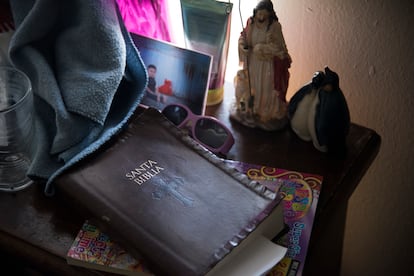The Bible enters public schools in Texas
The curriculum includes Bible-based lessons in elementary classrooms and in English, language arts, and literature textbooks

Texas is close to finalizing a controversial curriculum that would include Bible-based lessons in elementary classrooms, from kindergarten through fifth grade, in English, language arts, and literature textbooks. The measure is optional and school districts would not be required to employ it, but in exchange for doing so the state would offer them an incentive of $60 per student, resources paid for with state funds. The proposal comes directly from the Texas Education Agency (TEA), the official local government body in the matter, which after the passage of a law earlier this year was given the mandate to create its own free textbook.
If the plan is approved on November 22, school districts will be able to adopt it in August 2025, at the start of the next academic year. Greg Abbott, the state’s Republican governor, supports the initiative and has publicly approved all the materials developed by the TEA. Earlier this week, the Texas Association of School Boards gave the preliminary green light to Bible lessons, with an 8-7 vote, but the debate was such that it had to hear 150 public testimonies from people who support or reject the proposal.
Known as Bluebonnet Learning, the curriculum was developed under House Bill 1605, a 2023 law that radically changed the curriculum standards for Texas public schools. Four Democratic school board members and three Republicans voted against the plan; the remaining eight Republicans voted to approve it. Several parents, teachers, and education advocacy groups expressed concerns about the unnecessary introduction of religious concepts into schools, with teaching too focused on Christianity.
Educator Megan Tessler said the plan contradicts the mission of public schools: “This curriculum does not meet the standard of an honest, secular curriculum,” she testified. “Public schools are meant to educate, not indoctrinate.”
“I believe the Christian Bible is important and even fundamental, but that choice should not be made by the state for my family or any other,” argued another of the testimonies.
Supporters of the plan say studying Bible stories would help improve reading comprehension and teach morality. “Parents and teachers want a return to excellence,” said Cindy Asmussen. “Bible stories and concepts have been common for hundreds of years.”
One of the proposed lessons is the Golden Rule, which is most associated with Jesus’ teachings in the Sermon on the Mount, though it briefly mentions other religions. Mary Elizabeth Castle, a spokeswoman for Texas Values, a group that supports the plan, defended the inclusion of the Bible on the grounds that its influence on Western culture cannot be ignored and that banning it would be an attack on students’ “educational freedom.”
The Texas affiliate of the American Federation of Teachers, a union representing more than 60,000 school employees in the state, condemned the proposal for violating the separation of church and state, and fears this is just the beginning of greater religious influence in schools. “My assumption, in terms of Texas politics, is that this will pass, and we will see litigation,” Professor Martin Levy, a scholar at Texas Southern University’s Thurgood Marshall School of Law, told Houston-based television station Khou. The case could end up in the U.S. Supreme Court as a debate over religious freedom and the establishment clause: “The reality is you can’t really have religious freedom if the government establishes one.”
Texas is not the only state with similar initiatives. Republican-governed Oklahoma and Louisiana have pushed measures to teach the Bible in public schools. In June, Oklahoma’s superintendent of education ordered public schools to teach the Bible as part of the curriculum. The state also created the new Office of Religious Liberty and Patriotism within the Department of Education, an agency aligned with president-elect Donald Trump’s efforts to protect prayer in schools.
Florida law allows school districts to have volunteer chaplains to counsel students and provide guidance. And Louisiana is in the midst of a legal dispute over a law requiring public schools to display the Ten Commandments.
At the national level, with Trump’s victory in the U.S. elections on November 5, education could take a big turn. Trump promised during his campaign that he would abolish the Department of Education and threatened to cancel funding for schools that address issues such as racism in the classroom and recognize the transgender identity of students, although that remains to be seen because a president cannot replace a federal department with a signature.
Linda McMahon, a Trump campaign manager and fundraiser with no teaching background or experience in education policy, was nominated to lead the Department of Education in the next administration. McMahon has spent 16 years on the board of trustees of Sacred Heart University, a private Catholic institution.
Sign up for our weekly newsletter to get more English-language news coverage from EL PAÍS USA Edition
Tu suscripción se está usando en otro dispositivo
¿Quieres añadir otro usuario a tu suscripción?
Si continúas leyendo en este dispositivo, no se podrá leer en el otro.
FlechaTu suscripción se está usando en otro dispositivo y solo puedes acceder a EL PAÍS desde un dispositivo a la vez.
Si quieres compartir tu cuenta, cambia tu suscripción a la modalidad Premium, así podrás añadir otro usuario. Cada uno accederá con su propia cuenta de email, lo que os permitirá personalizar vuestra experiencia en EL PAÍS.
¿Tienes una suscripción de empresa? Accede aquí para contratar más cuentas.
En el caso de no saber quién está usando tu cuenta, te recomendamos cambiar tu contraseña aquí.
Si decides continuar compartiendo tu cuenta, este mensaje se mostrará en tu dispositivo y en el de la otra persona que está usando tu cuenta de forma indefinida, afectando a tu experiencia de lectura. Puedes consultar aquí los términos y condiciones de la suscripción digital.








































